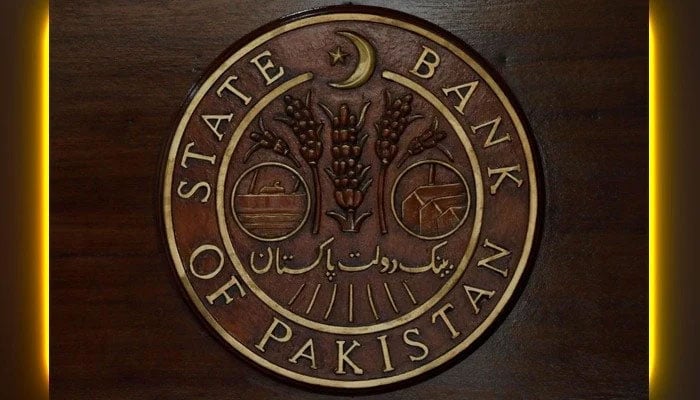SBP announces new steps to curb dollar outflows
The outflow of dollar has weakened rupee sharply in recent weeks
KARACHI: The State Bank of Pakistan on Wednesday sharply cut the amount of dollars individuals could buy specially for travelling to Afghanistan, amid concerns over outflows of foreign currency accelerating after the take over of Taliban in the neighboring country.
"In order to enhance transparency in the foreign currency transactions by exchange companies and to curb undesirable outflow of cash foreign currency, the SBP has introduced regulatory measures," the bank said in a statement. It said people travelling to Afghanistan will be allowed to carry only $1,000/- per person per visit with a maximum annual limit of $6,000.
Similarly exchange companies will be required to conduct biometric verification for all foreign currency sale transactions equivalent to $500/- and above and outward remittances. This requirement will be applicable with effect from October 20, 2021. "Exchange companies will sell the cash foreign currency and make outward remittances, equivalent to $10,000/- and above, against receipt of funds through cheque or banking channels only," the SBP said.
"These regulatory measures will help to improve documentation of sale of foreign currency by exchange companies and place a check on undesirable outflow of foreign currency."
The outflow of dollar weakened rupee sharply in recent weeks . On Wednesday rupee weakened to a new record low against the dollar as importer dollar demand surpassed mild selling of the greenback by exporters. The rupee close at 170.96 against the dollar in the interbank market. The local unit has fallen by 8.32 percent versus the dollar so far this fiscal year.
Some analysts, apart from domestic factors, see the regime change in Afghanistan weighs on the rupee as well.
They said the extra pressure on the rupee is due to the Afghanistan factor and the rupee remained under stress since the Taliban took control in Afghanistan and withdrawal the US forces from the country. There is an outflow of dollars to Afghanistan because of the scarcity of the US currency there amid dried foreign aid after the Taliban set up a government in the country.
The SBP, earlier in September issued new regulations, requiring banks to report $500,000 and above future foreign currency requirements for overseas buying, apparently in a move to step up monitoring of money flows and to make rupee less volatile. The SBP issued new guidelines making mandatory for banks to submit information related to their all forthcoming imports payments of $500,000 and above for the next five days. Earlier, the banks submit information of their expected payments exceeding $1 million. Prior to the new rules, banks were submitting details of imports arriving in two days.
In September the SBP also tightened rules on consumer lending to trim rapid loan growth mainly in imported car financing to slow down import growth and to support the balance-of-payments
Pakistan’s current account deficit jumped 81 percent month-on-month in August as a strong demand spurred imports, outpacing a recovery in exports. The current account deficit surged to $1.476 billion in August from $814 million in the previous month. It had posted a surplus of $255 million in August 2020.
This yawning was mainly due to higher trade deficit as imports continued to rise amid robust economic activity.
-
 Eric Dane's Girlfriend Janell Shirtcliff Pays Him Emotional Tribute After ALS Death
Eric Dane's Girlfriend Janell Shirtcliff Pays Him Emotional Tribute After ALS Death -
 King Charles Faces ‘stuff Of The Nightmares’ Over Jarring Issue
King Charles Faces ‘stuff Of The Nightmares’ Over Jarring Issue -
 Sarah Ferguson Has ‘no Remorse’ Over Jeffrey Epstein Friendship
Sarah Ferguson Has ‘no Remorse’ Over Jeffrey Epstein Friendship -
 A$AP Rocky Throws Rihanna Surprise Birthday Dinner On Turning 38
A$AP Rocky Throws Rihanna Surprise Birthday Dinner On Turning 38 -
 Andrew Jokes In Hold As BAFTA Welcomes Prince William
Andrew Jokes In Hold As BAFTA Welcomes Prince William -
 Sam Levinson Donates $27K To Eric Dane Family Fund After Actor’s Death
Sam Levinson Donates $27K To Eric Dane Family Fund After Actor’s Death -
 Savannah Guthrie Mother Case: Police Block Activist Mom Group Efforts To Search For Missing Nancy Over Permission Row
Savannah Guthrie Mother Case: Police Block Activist Mom Group Efforts To Search For Missing Nancy Over Permission Row -
 Dove Cameron Calls '56 Days' Casting 'Hollywood Fever Dream'
Dove Cameron Calls '56 Days' Casting 'Hollywood Fever Dream' -
 Prince William, Kate Middleton ‘carrying Weight’ Of Reputation In Epstein Scandal
Prince William, Kate Middleton ‘carrying Weight’ Of Reputation In Epstein Scandal -
 Timothée Chalamet Compares 'Dune: Part Three' With Iconic Films 'Interstellar', 'The Dark Knight' & 'Apocalypse Now'
Timothée Chalamet Compares 'Dune: Part Three' With Iconic Films 'Interstellar', 'The Dark Knight' & 'Apocalypse Now' -
 Little Mix Star Leigh-Anne Pinnock Talks About Protecting Her Children From Social Media
Little Mix Star Leigh-Anne Pinnock Talks About Protecting Her Children From Social Media -
 Ghislaine Maxwell Is ‘fall Guy’ For Jeffrey Epstein, Claims Brother
Ghislaine Maxwell Is ‘fall Guy’ For Jeffrey Epstein, Claims Brother -
 Timothee Chalamet Rejects Fame Linked To Kardashian Reality TV World While Dating Kylie Jenner
Timothee Chalamet Rejects Fame Linked To Kardashian Reality TV World While Dating Kylie Jenner -
 Sarah Chalke Recalls Backlash To 'Roseanne' Casting
Sarah Chalke Recalls Backlash To 'Roseanne' Casting -
 Pamela Anderson, David Hasselhoff's Return To Reimagined Version Of 'Baywatch' Confirmed By Star
Pamela Anderson, David Hasselhoff's Return To Reimagined Version Of 'Baywatch' Confirmed By Star -
 Willie Colón, Salsa Legend, Dies At 75
Willie Colón, Salsa Legend, Dies At 75




